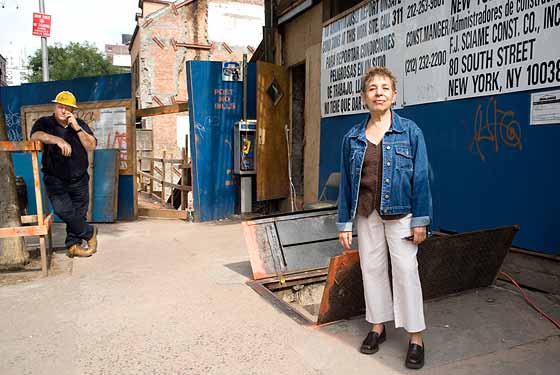
At her kitchen window, poet Hettie Jones jingles the sacred cowbells that hang there, which were a gift from Allen Ginsberg and Peter Orlovsky after their trip to India in the early sixties. Not that you can hear their chime over the loud whirring of what she calls “The Hurricane,” an asbestos-removing machine being used on the construction site that literally surrounds her old building with a deep dry moat. By late next year, a 23-story hotel will subsume 27 Cooper Square. In the meantime, she’s living in a sort of precarious tenement tree house.
In 1962, when Jones moved into the top floor of the former rooming house with her then-husband, LeRoi Jones (now Amiri Baraka), “it had been vacant for more than ten years,” she says. They had no gas, no heat, and no sink, and the rent was $100 a month. Beat and Black Mountain poets would stop by. “Back then, there was more of a cross-fertilization of art than there may be now,” she says. “It was never before a place where the bridge-and-tunnel folks came to get drunk on a Saturday night and crowd the thoroughfares.” Back then, Jones remembers, she would open her windows to listen to her neighbor Archie Shepp playing the blues on his sax.
And Jones is going to remain, her garret a sort of monument to the old days, in the steely luxury bosom of the high-rise; apparently, this is all with the sentimental consent of the developers. In the summer of 2005, Jones met with hoteliers Gregory Peck and Matthew Moss to explain to them the significance of the lot they were building on. She showed them archival photos: In one, taken in 1861, the Seventh Regiment assembled in front of her building just before departing for service in the Civil War.
Jones’s predicament isn’t new: In the eighties, Jean Herman wouldn’t budge from her $168-a-month apartment on 134 East 60th Street across from Bloomingdale’s, even after developers offered her $650,000. The 31-story office tower had to be redesigned around her; Herman died in 1992, the sole occupant of the building.
Jones says Peck and Moss never tried very hard to get her out. “If they’d offered me $3 million, I would’ve moved across the street into the Carl Fischer Building. I’m not stupid,” she says. She says that when she told Moss, “I just want to stay here till I croak,” his response was, “Well, you have every right.” And Peck insists, “There was no way we were going to tear it down.” Though looking at the reinforced shell of the building today, it’s hard to say that he didn’t pretty much do just that. When Jones saw the hole in her building, she thought, “Holy shit, you can see right through it.” Nevertheless, “there’s something in me that’s always had great faith,” she says. “I believe that history should be preserved. So when I see that hole, I think, They’ll fill it in, they’ll take care of me. Nobody is out to kill me.” The first floor of the building, formerly a karaoke bar, will become the hotel’s lounge. “That’s the true advantage,” Jones says, watching the heavy drilling from her roof. “This noise is nothing compared to drunk people singing.”
Have good intel? Send tips to intel@nymag.com.